I love that quote from L.R.Knost. Learning how to use this moment has made a huge difference in our lives. But we still fall back into old habits sometimes. None of us is perfect so we keep practicing, trying again, and making amends when we mess up.
If you’re just starting out, or keep getting stuck, I’ve put together a few suggestions that may help and a worksheet you can use to work through them:
Plan and Practice
Make a plan (and be sure to write it down! You’ll find the worksheet at the end of this post). What are your usual triggers? How do you react to them? What could you choose to do differently next time? How will you hold yourself accountable? Practice this on your own or with a friend/partner when all is calm.
A few ideas you might try: switch to humour/silliness, decide with the kids ahead of time about what should happen during those times- then remind them and calmly stick to it, have a code word to use when anyone needs a break, close your eyes and breathe while you count back from 10, take a break on your own for a few minutes
Reflect and Keep Trying
Reflect on how your plan is going. Celebrate even the smallest of improvements. Give yourself grace if you’re not doing as well as you hoped- you’re learning something new and won’t always be able to do it well right away or every time (just like your kids). If it’s still not improving, look for another option to try. Do you have someone you could ask about it who’s on a similar path? You can also ask in our Facebook community, join an upcoming workshop, or contact me about coaching options.
Make Amends
When we lose it with our kids we need to apologize and find a way to fix things with them. They need to know it’s not okay to respond that way just because we’re upset or we have more power. Making amends helps maintain our relationship and also models the process for them. In Positive Discipline we use the “4 R’s of Recovery” which are recognize, responsibility, reconcile, and resolve. You can find more about the process here and here (they previously only used 3 R’s but now include responsibility separately).
Going Further
Practicing mindfulness is especially helpful with learning how to pause. When you take even a few minutes a day to focus on being present in the moment, you bring that ability with you into other times throughout your day. If finding the ability to pause at all is a challenge, try starting here.
It also helps to talk with your kids about changes you’re making and connect this with other things they’re learning too (which might also be staying calm, or a sport, or an instrument). Talk about what strategies you’re trying and encourage each other.
There may be times when any of this is just too much. You or your child may need extra help from a professional. Please don’t hesitate or be afraid of getting this help when you need it.
Do you have any other suggestions? What’s worked best for you?
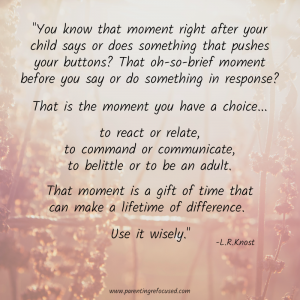


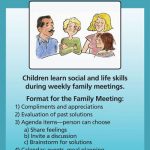
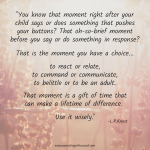
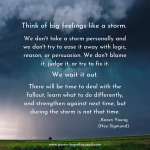
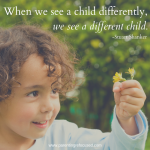
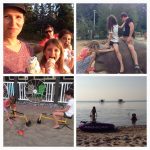
Comments